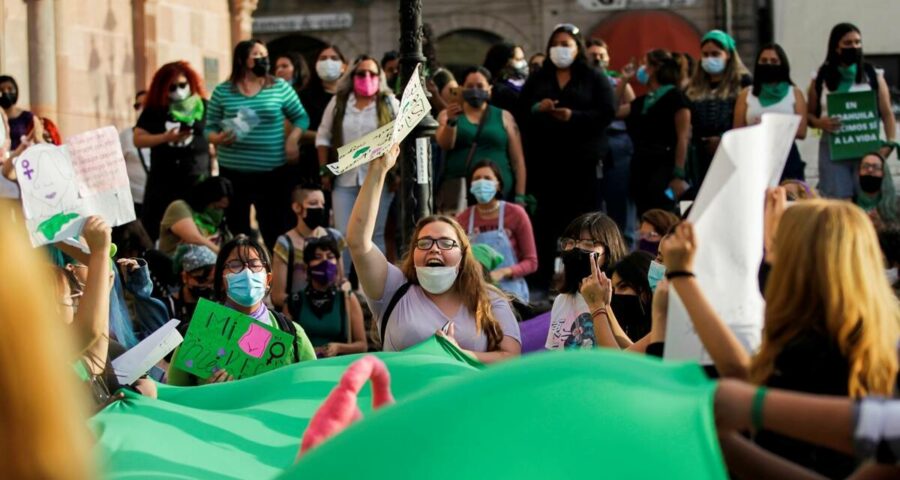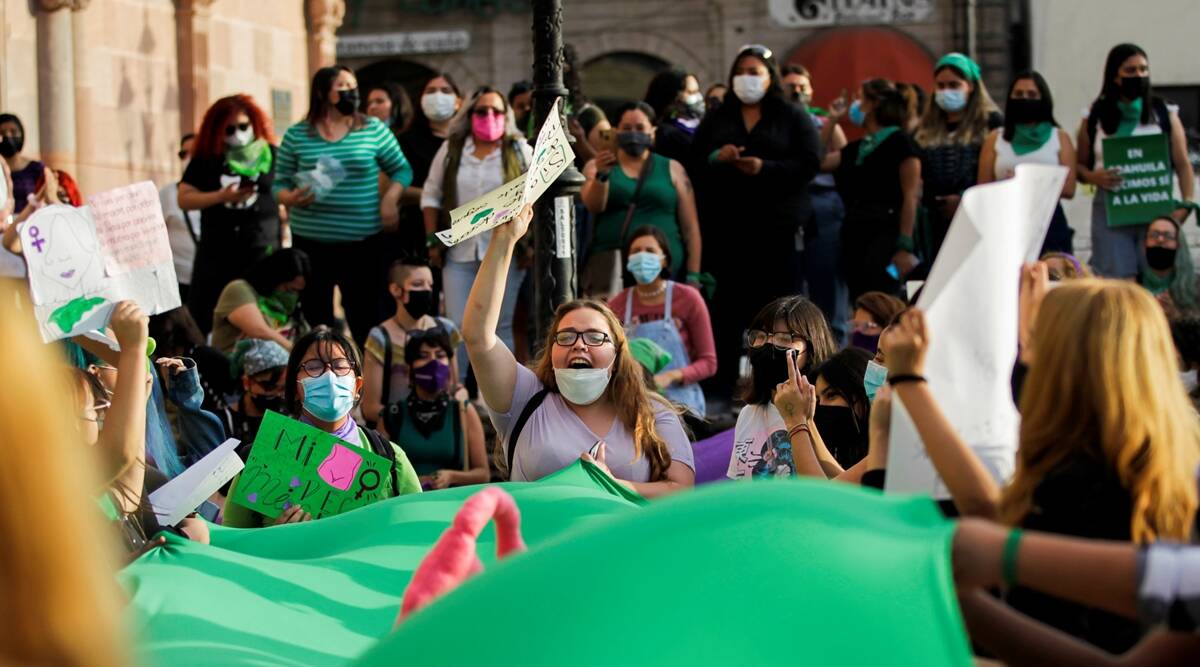Activists in Mexico have already begun working on a strategy to force states to fall in line with the court’s ruling, though their fight to make abortion legal and safe across the country could be a long one.
Written By Natalie Kitroeff and Oscar Lopez
When the Supreme Court in Mexico issued a historic decision on Tuesday declaring that having an abortion was not a crime, activists across the country celebrated. On Wednesday, they got back to work, taking on the long and arduous process of ensuring that the legal shift applies across Mexico.
Among their top priorities are helping the women who need it most: those facing criminal penalties, often after having been reported to the authorities for trying to induce an abortion themselves under dangerous conditions.
“A woman who decides to get an abortion is already vulnerable, and then we also have to confront the dire situation of believing we will face punishment,” said Yetlanezi Pech, who was rushed to a hospital, bleeding, after an attempted abortion, only to have an emergency room doctor deny her help and turn her in to authorities.
“I felt so much fear, I felt so unsafe, I felt really, really bad,” she said. “And I also felt alone.”
Pech is among thousands of women who have been investigated for illegally obtaining abortion in recent years. In the first seven months of this year alone, 432 investigations were opened across Mexico into cases of illegal abortion, according to the Mexican government.
The ruling Tuesday set a legal precedent for the nation — and stands in stark contrast to the trend in the United States, where Texas and other states have recently moved to restrict abortion. The court’s decision also raised the prospect of Mexico eventually becoming a destination for American women seeking to end their pregnancies, advocates said, though that would require removing the many obstacles that make abortion difficult to obtain in much of the country.
Tuesday’s decision applies only to the border state of Coahuila, and putting it into practice nationwide requires either legal challenges in each of the 28 states in Mexico that still criminalize the procedure, or a change in law by state legislatures. The justices did not specify how far into a pregnancy a woman can legally obtain an abortion, meaning those terms will likely be determined at the state level.
A leading abortion rights group in Mexico, GIRE, said that it would push for abortion to be legal in Coahuila for 12 weeks after conception at a minimum — a time limit established in the law that made abortion legal in Mexico City and which was previously validated by the Supreme Court.
If that were the case, Coahuila would have more permissive abortions rules than neighboring Texas, where the state legislature recently implemented a law that prohibits most abortions after about six weeks. In time, women from Texas could potentially cross the border to have an abortion — but for now, there wouldn’t be enough infrastructure in place to meet the need, activists said.
“There is more to be done before women and people who can get pregnant in Texas are able to get the service in Coahuila,” said Melissa Ayala García, coordinator of litigation for GIRE. “We still have a ways to go to ensure the service is provided.”
The Texas law bars abortions once cardiac activity can be detected in the embryo. There is no heart at this stage of development, only electrical activity in developing cells that starts at around six weeks, before many women are even aware they are pregnant.
Activists in Mexico have already begun working on a strategy to force states to fall in line with the court’s ruling, though their fight to make abortion legal and safe across the country could be a long one. Only Mexico City, and three other states, allowed abortions on request before Tuesday’s decision.
“We are already organized and ready to take advantage of the opportunity that the court’s new decision offers,” said Arely Torres Miranda, a reproductive rights advocate in the state of San Luis Potosí. “What we need to do is make them change the law.”
That plan is likely to meet resistance. Mexico’s conservative PAN party, one of the main opposition parties, has fought efforts to legalize the procedure.
“The party clearly has both in its platform and in its principles the right to life from conception,” said Damián Zepeda Vidales, a PAN senator and former party leader.
Zepeda, who said he would personally oppose legalization efforts in the Senate, added that the party was waiting until the Supreme Court published the decision behind Tuesday’s ruling to determine its national strategy.
Since Mexico City legalized abortion in 2007, a network of activists based there has worked to offer women seeking abortion a safe path, either by transporting them to the capital or providing them misoprostol, a drug commonly used to induce abortion.
But many women are too scared to reach out to those groups and opt to obtain clandestine abortions.
“We have seen terrible cases where they do it with coat hangers, where they hit their bellies,” Torres Miranda said. “They put their lives at risk.”
When those methods go wrong or lead to excessive bleeding, women often go to hospitals. But federal law requires medical providers to notify authorities when a patient presents signs of having been involved in criminal activity — such as having an abortion.
“Yesterday’s ruling will also allow us, when we modify the law, to remove the obligation for the health sector to report when they discover an abortion,” Torres Miranda said.
Generally, the women who are most marginalized — who are poor and live in rural areas — are the ones who face criminal penalties for having an abortion, Torres Miranda said.
It was not clear how many women in total are currently facing prosecution or are in prison for having an abortion, activists said, because comprehensive state-level data has been difficult to gather.
Pech said that as soon as she got to the emergency room after her at-home abortion went wrong two years ago, she was treated as if she did not deserve medical attention. The doctor who admitted Pech accused her of being a drug addict and persuaded her colleagues not to offer any help.
“No one wanted to come near me because I was in the process of having an abortion,” Pech said. When she was finally taken to surgery, she said, her partner at the time was told that both of them would soon be detained for the crime of ending the pregnancy.
“The same doctor who received me called the authorities to come arrest me,” she said. She was able to quickly hire a lawyer and avoid arrest. But before the lawyer agreed to fight the case in court, he came to her house to deliver an ultimatum.
“He told me I had to ask God for forgiveness for what I had done,” she said. “And then he would help me.”
Pech, who has two sons, said that with the lawyer’s assistance she managed to avoid facing criminal penalties.
Tuesday’s landmark decision is the first of several cases on abortion rights to be taken up by the Supreme Court this month. On Thursday, justices will examine whether a provision in a Sinaloa state law that protects life from conception is similarly unconstitutional. Given the court’s recent rulings in favor of abortion access, analysts say it is very likely that the judges will rule to strike the law.
“That would also be historic,” said Ayala of GIRE. “We are in a very, very, very important September.”
But among the general population, the issue remains divisive: Mexico is a largely socially conservative country where the Catholic church holds significant sway. A majority of Mexicans are still opposed to legal abortion, polling shows.
But attitudes have shifted over time. In 2005, just 12% of the country was in favor of legalizing abortion in all cases, according to a poll from the research firm Parametria. A 2019 poll conducted by El Financiero newspaper found that almost one-third of Mexicans said they were in favor of full legalization.
This week’s decision signaled, for Pech at least, that change may finally come, and other women may be spared the suffering she experienced.
“This opens the possibility that these things won’t happen anymore,” she said. “There’s no reason this has to happen.”
Source: Read Full Article


